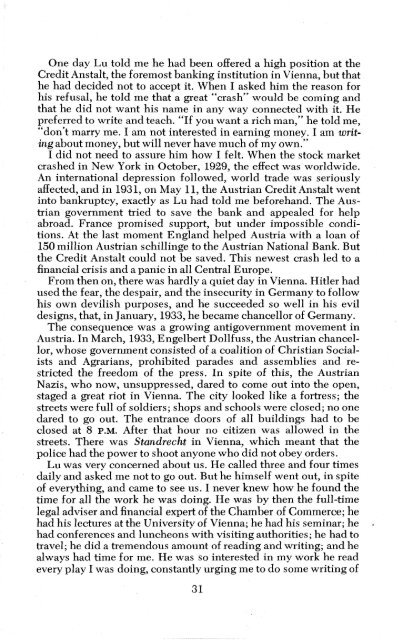My Years with Ludwig von Mises.pdf - The Ludwig von Mises Institute
My Years with Ludwig von Mises.pdf - The Ludwig von Mises Institute
My Years with Ludwig von Mises.pdf - The Ludwig von Mises Institute
Create successful ePaper yourself
Turn your PDF publications into a flip-book with our unique Google optimized e-Paper software.
One day Lu told me he had been offered a high position at the<br />
Credit Anstalt, the foremost banking institution in Vienna, but that<br />
he had decided not to accept it. When I asked him the reason for<br />
his refusal, he told me that a great "crash" would be coming and<br />
that he did not want his name in any· way connected <strong>with</strong> it. He<br />
preferred to write and teach. "If you want a rich man,~~ he told me,<br />
"don~t marry me. I am not interested in earning money. I am writingabout<br />
money, but will never have much of my own."<br />
I did not need to assure him how I felt. When the stock market<br />
crashed in New York in October, 1929, the effect was worldwide.<br />
An international depression followed, world trade was seriously<br />
affected, and jn 1931, on May 11, the Austrian Credit Anstalt went<br />
into bankruptcy, exactly as Lu had told me beforehand. <strong>The</strong> Austrian<br />
government tried to save the bank and appealed for help<br />
abroad. France promised support, but under impossible conditions.<br />
At the last moment England helped Austria <strong>with</strong> a loan of<br />
150 million Austrian schillinge to the Austrian National Bank. But<br />
the Credit Anstalt could not be saved. This newest crash led to a<br />
financial crisis a~d a panic in all Central Europe.<br />
From then on, there was hardly a quiet day in Vienna. Hitler had<br />
used the fear, th~ despair, and the insecurity in Germany to follow<br />
his own devilish purposes, and he succeeded so well in his evil<br />
designs, that, in January, 1933, he became chancellor of Germany.<br />
<strong>The</strong> consequence was a growing antigovernment movement in<br />
Austria. In March, 1933, Engelbert Dollfuss, the Austrian chancellor,<br />
whose government consisted of a coalition of Christian Socialists<br />
and Agrarians, prohibited parades and assemblies and restricted<br />
the freedom of the press. In spite of this, the Austrian<br />
Nazis, who now, unsuppressed, dared to come out into the open,<br />
staged a great riot in Vienna. <strong>The</strong> city looked like a fortress; the<br />
streets were full of soldiers; shops and schools were closed; no one<br />
dared to go out. <strong>The</strong> entrance doors of all buildings had to be<br />
closed at 8 P.M. After that hour no citizen was allowed in the<br />
streets. <strong>The</strong>re was Standrecht in Vienna, which meant that the<br />
police had the power to shoot anyone who 'did not obey orders.<br />
Lu was very concerned about us. He called three and four times<br />
daily and asked me not to go out. But he himself went out, in spite<br />
of everything, and came to see us. I never knew how he found the<br />
time for all the work he was doing. He was by then the full-time<br />
legal adviser and financial expert of the Chamber of Commerce; he<br />
had his lectures at the University of Vienna; he had his seminar; he<br />
had conferences and luncheons <strong>with</strong> visiting authorities; he had to<br />
travel; he did a tremendous amount of reading and writing; and he<br />
always had time for me. He was so interested in my work he read<br />
every play I was doing, constantly urging me to do some writing of<br />
31

















